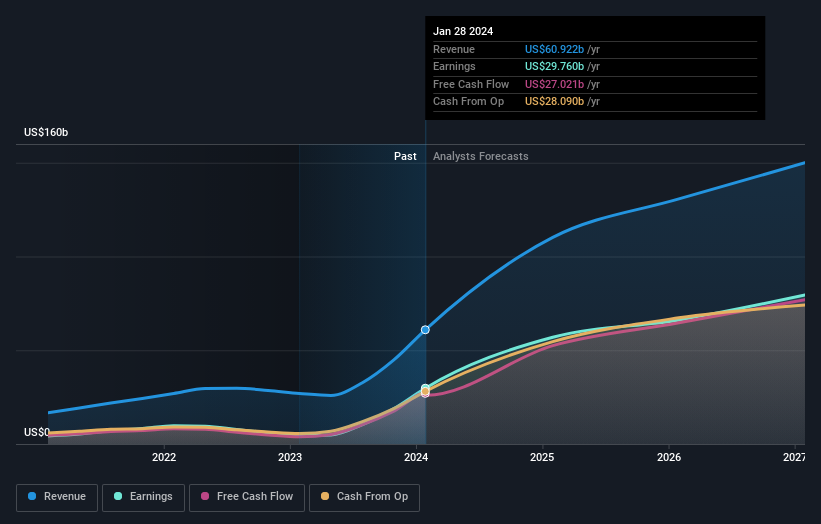NVIDIA Corporation's (NASDAQ:NVDA) high institutional ownership speaks for itself as stock continues to impress, up 14% over last week
Key Insights
Significantly high institutional ownership implies NVIDIA's stock price is sensitive to their trading actions
A total of 25 investors have a majority stake in the company with 45% ownership
To get a sense of who is truly in control of NVIDIA Corporation (NASDAQ:NVDA), it is important to understand the ownership structure of the business. We can see that institutions own the lion's share in the company with 68% ownership. That is, the group stands to benefit the most if the stock rises (or lose the most if there is a downturn).
And last week, institutional investors ended up benefitting the most after the company hit US$2.1t in market cap. One-year return to shareholders is currently 267% and last week’s gain was the icing on the cake.
Let's delve deeper into each type of owner of NVIDIA, beginning with the chart below.
View our latest analysis for NVIDIA
What Does The Institutional Ownership Tell Us About NVIDIA?
Many institutions measure their performance against an index that approximates the local market. So they usually pay more attention to companies that are included in major indices.
We can see that NVIDIA does have institutional investors; and they hold a good portion of the company's stock. This can indicate that the company has a certain degree of credibility in the investment community. However, it is best to be wary of relying on the supposed validation that comes with institutional investors. They too, get it wrong sometimes. It is not uncommon to see a big share price drop if two large institutional investors try to sell out of a stock at the same time. So it is worth checking the past earnings trajectory of NVIDIA, (below). Of course, keep in mind that there are other factors to consider, too.
Since institutional investors own more than half the issued stock, the board will likely have to pay attention to their preferences. Hedge funds don't have many shares in NVIDIA. The Vanguard Group, Inc. is currently the largest shareholder, with 8.3% of shares outstanding. BlackRock, Inc. is the second largest shareholder owning 7.3% of common stock, and FMR LLC holds about 4.9% of the company stock. In addition, we found that Jen-Hsun Huang, the CEO has 3.5% of the shares allocated to their name.
On studying our ownership data, we found that 25 of the top shareholders collectively own less than 50% of the share register, implying that no single individual has a majority interest.
While studying institutional ownership for a company can add value to your research, it is also a good practice to research analyst recommendations to get a deeper understand of a stock's expected performance. Quite a few analysts cover the stock, so you could look into forecast growth quite easily.
Insider Ownership Of NVIDIA
The definition of an insider can differ slightly between different countries, but members of the board of directors always count. The company management answer to the board and the latter should represent the interests of shareholders. Notably, sometimes top-level managers are on the board themselves.
I generally consider insider ownership to be a good thing. However, on some occasions it makes it more difficult for other shareholders to hold the board accountable for decisions.
We can see that insiders own shares in NVIDIA Corporation. Insiders own US$84b worth of shares (at current prices). It is good to see this level of investment. You can check here to see if those insiders have been buying recently.
General Public Ownership
With a 28% ownership, the general public, mostly comprising of individual investors, have some degree of sway over NVIDIA. While this size of ownership may not be enough to sway a policy decision in their favour, they can still make a collective impact on company policies.
Next Steps:
I find it very interesting to look at who exactly owns a company. But to truly gain insight, we need to consider other information, too. Be aware that NVIDIA is showing 1 warning sign in our investment analysis , you should know about...
If you are like me, you may want to think about whether this company will grow or shrink. Luckily, you can check this free report showing analyst forecasts for its future.
NB: Figures in this article are calculated using data from the last twelve months, which refer to the 12-month period ending on the last date of the month the financial statement is dated. This may not be consistent with full year annual report figures.
Have feedback on this article? Concerned about the content? Get in touch with us directly. Alternatively, email editorial-team (at) simplywallst.com.
This article by Simply Wall St is general in nature. We provide commentary based on historical data and analyst forecasts only using an unbiased methodology and our articles are not intended to be financial advice. It does not constitute a recommendation to buy or sell any stock, and does not take account of your objectives, or your financial situation. We aim to bring you long-term focused analysis driven by fundamental data. Note that our analysis may not factor in the latest price-sensitive company announcements or qualitative material. Simply Wall St has no position in any stocks mentioned.

 Yahoo Finance
Yahoo Finance 

